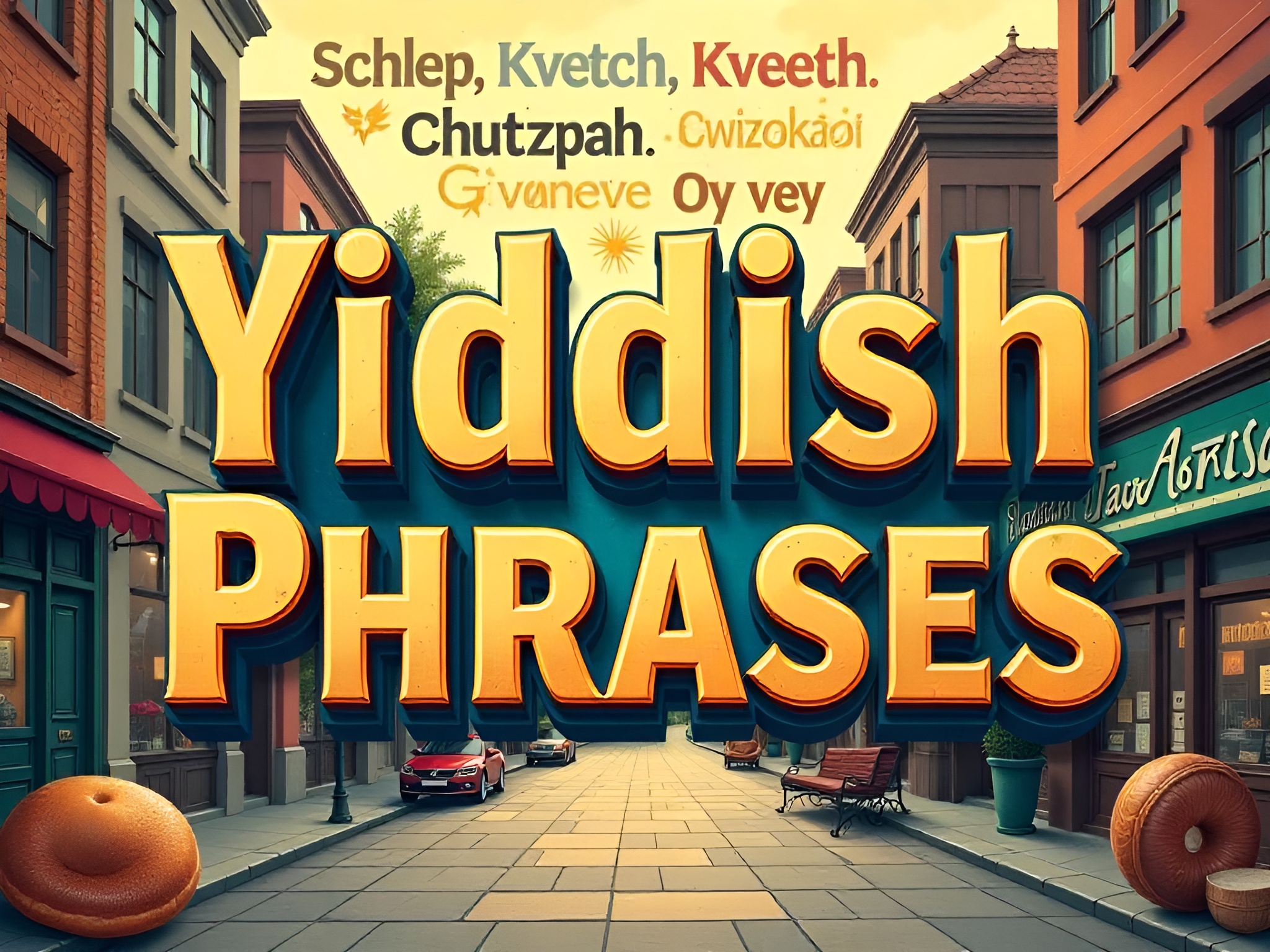- MISC
Creative Earth Day Poster Ideas to Inspire Action and Awareness


Yiddish is a language rich with humor, warmth, and colorful expressions. Spoken primarily by Ashkenazi Jews, it blends German, Hebrew, and Slavic influences, making it a truly unique and expressive language. Even if you’re not fluent in Yiddish, you’ve probably heard words like “chutzpah,” “schmuck,” or “kvetch” used in everyday conversation. Whether you want to add some flair to your vocabulary, understand classic Yiddish humor, or impress your Jewish grandmother, here are 50 essential Yiddish phrases that you should know!
Shalom Aleichem – “Peace be upon you.” A traditional greeting.
Zei gezunt – “Be healthy.” A way of saying goodbye.
A dank – “Thanks!” Short for “A sheynem dank” (A great thanks).
L’chaim! – “To life!” A toast used when drinking.
Mazel tov! – “Good luck!” Often used to congratulate someone.
Nu? – “Well?” or “So?” Used to prompt someone for an answer.
Tuchus afn tish – “Put your backside on the table.” Meaning: Be honest, say what you really think.
Shlep – To drag or carry something heavy, or to move around tiredly.
Gai gezunterheyt! – “Go in good health!” A way of saying goodbye.
Farblondzhet – Lost or confused. “He looked farblondzhet trying to find the subway.”
Mensch – A good, honorable person.
Schmuck – A fool or a jerk (not a nice word, but commonly used).
Schlemiel – A clumsy person who always spills the soup.
Schlimazel – A very unlucky person who gets spilled on.
Nebbish – A timid, ineffectual person.
Yutz – A dim-witted person.
Nudnik – An annoying, persistent person who won’t stop talking.
Schnorrer – Someone who always asks for favors but never returns them.
Chutzpah – Boldness, nerve, or audacity (sometimes admirable, sometimes not).
Kvetch – A complainer or someone who always finds something to whine about.
Gornisht helfn – “Nothing will help.” Used when someone is beyond fixing.
A klutz mit di hent – “A klutz with hands.” Someone who’s completely clumsy.
A shanda far di goyim – “A shame in front of the non-Jews.” Someone who embarrasses their community.
Bubkes – Literally “goat droppings.” Meaning: Nothing, worthless.
Dreck – Trash or something of low quality.
Farshtunken – Rotten or disgusting.
Meshugener – A crazy person.
Luftmensch – A dreamer who has their head in the clouds.
Oy vey! – “Oh no!” or “Oh dear!” A classic Yiddish exclamation.
Shmendrik – A weak, foolish person.
Mit a gantzen hartz – “With all my heart.” Used for emphasis.
Hak mir nisht keyn chaynik – “Don’t bang on my teapot.” Meaning: Stop bothering me!
Loz im geyn – “Let him go.” Used when you don’t want to argue.
Ess gezunterheyt! – “Eat in good health!” Said before a meal.
Gey kaken oifen yam – “Go take a poop in the ocean.” A not-so-polite way of telling someone to get lost.
Alles tzu gut – “May everything turn out well.” A way to wish someone good luck.
Fun dir a klap, fun mir a dank – “From you, a slap; from me, a thanks.” Meaning: You can’t insult me, I don’t care.
Tsuris – Troubles, problems, or misfortune.
Putz – An idiot, similar to “schmuck.”
Shluffy – Sleepy or tired.
Man plans, and God laughs – A famous Yiddish proverb about the unpredictability of life.
If hings were better, they wouldn’t be worse – A way of saying, “It could always be worse!”
A little bit of luck is better than a lot of wisdom – Sometimes luck matters more than intelligence.
If you don’t want to do something, one excuse is as good as another – Perfect for procrastinators!
A wise man hears one word and understands two – A reminder to read between the lines.
An old man’s thought is on the tip of his tongue – Meaning: Old people say whatever they’re thinking!
You can’t dance at two weddings at once – A way of saying, “You can’t do everything.”
If the rich could hire the poor to die for them, the poor would make a good living – A sarcastic way to talk about inequality.
Trouble comes at a gallop and goes away at a crawl – Bad things happen fast, but take a long time to fix.
The only thing you get for free is trouble – Nothing in life is truly free.
Yiddish is full of wit, wisdom, and warmth, making it one of the most expressive languages in the world. Whether you’re looking to add some charm to your vocabulary, impress your Jewish friends, or just enjoy the richness of the language, these 50 Yiddish phrases are a great start.
Which phrase was your favorite? Try using some of these expressions in everyday life—you might find that Yiddish adds the perfect touch of humor and heart to any conversation!